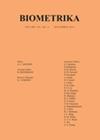Regression analysis of group-tested current status data
IF 2.4
2区 数学
Q2 BIOLOGY
引用次数: 0
Abstract
Summary Group testing is an effective way to reduce the time and cost associated with conducting large-scale screening for infectious diseases. Benefits are realized through testing pools formed by combining specimens, such as blood or urine, from different individuals. In some studies, individuals are assessed only once and a time-to-event endpoint is recorded, for example, the time until infection. Combining group testing with this type of endpoint results in group-tested current status data (?). To analyse these complex data, we propose methods which estimate a proportional hazards regression model based on test outcomes from measuring the pools. A sieve maximum likelihood estimation approach is developed that approximates the cumulative baseline hazard function with a piecewise constant function. To identify the sieve estimator, a computationally efficient expectation-maximization algorithm is derived by using data augmentation. Asymptotic properties of both the parametric and nonparametric components of the sieve estimator are then established by applying modern empirical process theory. Numerical results from simulation studies show that our proposed method performs nominally and has advantages over the corresponding estimation method based on individual testing results. We illustrate our work by analysing a chlamydia dataset collected by the State Hygienic Laboratory at the University of Iowa.对分组测试的现状数据进行回归分析
摘要 群体检测是减少大规模传染病筛查所需的时间和成本的有效方法。通过将不同个体的血液或尿液等标本组合成检测池,可实现效益。在某些研究中,只对个体进行一次评估,并记录时间终点,如感染前的时间。将分组检测与这类终点相结合,就会得到分组检测的当前状态数据(?)为了分析这些复杂的数据,我们提出了一些方法,这些方法基于测量池的测试结果来估计比例危险回归模型。我们开发了一种筛网最大似然估计方法,用一个片断常数函数来近似累积基线危害函数。为了确定筛网估计器,利用数据扩增推导出了一种计算高效的期望最大化算法。然后,通过应用现代经验过程理论,建立了筛网估计器的参数和非参数部分的渐近特性。模拟研究的数值结果表明,与基于单个测试结果的相应估算方法相比,我们提出的方法具有显著的性能和优势。我们通过分析爱荷华大学国家卫生实验室收集的衣原体数据集来说明我们的工作。
本文章由计算机程序翻译,如有差异,请以英文原文为准。
求助全文
约1分钟内获得全文
求助全文
来源期刊

Biometrika
生物-生物学
CiteScore
5.50
自引率
3.70%
发文量
56
审稿时长
6-12 weeks
期刊介绍:
Biometrika is primarily a journal of statistics in which emphasis is placed on papers containing original theoretical contributions of direct or potential value in applications. From time to time, papers in bordering fields are also published.
 求助内容:
求助内容: 应助结果提醒方式:
应助结果提醒方式:


